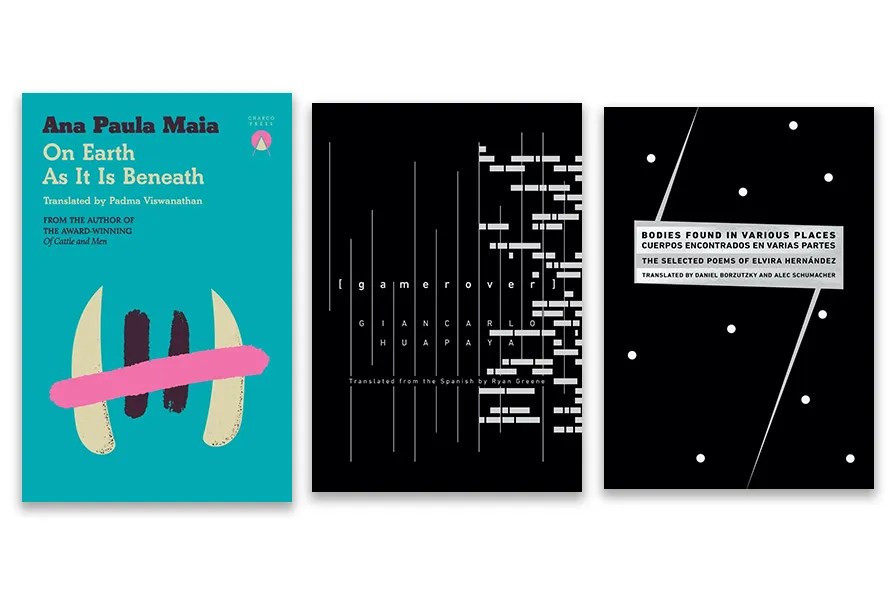RITA DI SANTO draws attention to a new film that features Ken Loach and Jeremy Corbyn, and their personal experience of media misrepresentation
Error message
An error occurred while searching, try again later.LEO BOIX reviews a novella by Brazilian Ana Paula Maia, and poetry by Peruvian Giancarlo Huapaya, and Chilean Elvira Hernandez


ANA PAULA MAIA’S On Earth As It Is Beneath (Charco Press, £11.99), translated with visceral precision by Padma Viswanathan, opens with a landscape already half-consumed by ruin: “Little is left, men or animals. Hoes and sickles lie where they were dropped, in the corners of fields dried up for lack of rain. A narrow, stinking creek provides water, but it dwindles visibly day by day.”
From this stark beginning unfolds a searing novella set in a remote Brazilian penal colony, where history’s sediment of slavery, state violence and abandonment seeps into every corner. Connected to Maia’s acclaimed Of Cattle And Men, this tale plunges us into a prison where people enter but never emerge, a purgatory overseen by wardens as brutal as the inmates they guard.
The atmosphere is suffocating, the laws of humanity eroded, and the figure of Melquiades — an avatar of vengeance with no restraint — casts a shadow of terror across its pages. By the time the book reaches its chilling conclusion, Maia has delivered a masterclass in suspense and allegory, a hypnotic descent into the underworld of cruelty and survival.
If Maia’s fiction excavates violence in the depths of Brazil, Peruvian poet, editor and curator Giancarlo Huapaya detonates language itself in his electrifying collection [gameover] (Deep Vellum, £13.99), translated by Ryan Greene.
Divided into eight sections, Huapaya’s book bristles with invention: visual poems scattered across the page in explosive configurations, fragments that mimic maps, algorithms, historic documents, or gun sights. The section Scenic Views, inspired by Jorge Eduardo Eielson and maps of Phoenix, Arizona, is particularly striking.
Here, poetry becomes both a cartography and a critique, exposing supremacist violence, systemic racism and the fractures of the Latinx experience in the US. Huapaya forces his readers into an accelerated rhythm, a dizzying pace that mirrors the urgency of his themes: “phoenix is/ phoenix is a monument to man’s arrogance/ was the algorithm’s/ first response.”
This is poetry as warning flare and counterattack — unsettling, dazzling, necessary.
From the US via Peru, we move to Chile, where Elvira Hernandez’s Bodies Found in Various Places/Cuerpos encontrados en varias partes (Cardboard House, £13), translated by Daniel Borzutzky and Alec Schumacher, gathers together one of Latin America’s most vital poetic voices.
Central to this collection is The Chilean Flag (La bandera de Chile), written clandestinely in 1981 under Pinochet’s dictatorship and smuggled into existence a decade later. The poem unfurls the flag as both national symbol and shroud, exposing how the apparatus of state violence wraps itself around the body politic.
Hernandez’s writing is incandescent with resistance, transforming metaphor into protest, lament and survival. The anthology also includes selections from Giddy Up, Halley!, Corporal Punishment, Santiago Waria, and Bodies Found in Various Places, the last confronting historical and symbolic desecrations of the human body: “the crown of thorns was just another laurel wreath… the bones remained intact for eternity without distress.”
Hernandez’s work is a testament to poetry’s power to endure and to indict, carrying a luminous political force into English for the first time in this breadth.
What unites Maia, Huapaya, and Hernandez — each distinct in genre, form, and geography — is their relentless insistence on facing violence head-on, whether through narrative, linguistic disruption, or lyrical defiance. All three books grapple with histories of injustice — slavery, dictatorship, supremacist violence — that continue to reverberate through Latin America and beyond. But they also testify to the imaginative resilience of art.
Together, these works chart not only Latin America’s wounds but also its literature’s visionary capacity, to remember, resist and reimagine.










